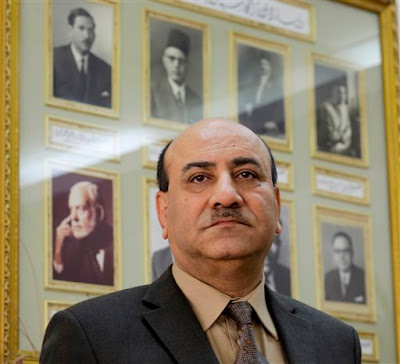 |
Protesters in Suez attempt to enter hospital to retrieve body of dead protester, January 26, 2011
Reuters/Mohamed Abd El-Ghany |
There is nothing surprising in the Sisi
government’s anticipatory
prep work for the five-year anniversary of the revolution. For weeks now,
media shills have disseminated a message of terror, assuring viewers of the
state’s violence if they dare go out on the streets. More subtle though no less
vicious, Hamdeen Sabahy, once an opposition
maverick and now one of Sisi’s civilian stooges, was trotted out in an interminable interview to deliver the
same warnings. Sisi himself is trying to reclaim the date as a police
commemoration, surrounding himself with the families of killed police officers
like so many props.
The only surprise is the transparency of the
fear gripping Egypt’s rulers. For a military clique hyper-concerned about
projecting an image of effortless control, the package of anticipatory measures
virtually screams panic and insecurity. This is odd, since Sisi’s government
has already updated a law criminalizing public demonstrations; filled prisons
with both critics and supporters of the Muslim Brothers; imprisoned the elected
president, Dr. Mohamed Morsi, on outlandish charges, with no international
censure to speak of; turned the civilian political class into adjuncts of
military rule; and shows no compunction about arresting and/or killing peaceful
demonstrators and passersby. So why the fear?
It seems to me that the most lasting legacy of
Egypt’s revolution is not that it banished fear within the population, or
somehow imbued Egyptians with a new consciousness that they didn’t have before.
The majority of Egyptians have always been and are acutely aware of the
workings of oppression in their lives. Like other subjugated people, they have
no illusions about how arbitrarily and violently they’re ruled, they just lack
the means to change it. For a brief, wondrous interlude in 2011-2013, a
breathtaking historic accident, they outflanked their rulers and made
themselves sovereign. One day, they went out to protest police brutality, and
in short order, toppled a thirty-year autocrat, threw out some governors and
other mini-dictators, bitterly fought over a new constitution, freely elected a
parliament and president, and practiced other forms of politics with a gusto
and sense of purpose unseen even during Egypt’s other great revolt in spring
1919.
The wonderfully subversive happening that was the 2011
revolution put fears in the hearts of Egypt’s privileged castes: the military
generals who basked in unearned assets and a false mystique of professionalism;
the business clique that grew out of the illegitimate union between public
power and private wealth; and a pathetic, parasitic cultural elite animated by
nothing more than hatred for the general population and its ‘primitive,’ ‘traditional’
ways.
Even though they’ve decisively recaptured the summits
of state and economy, I don’t think that this generation of military generals, big
bureaucrats, crony capitalists, and cultural hacks will ever forget the humiliation
and displacement that January 25th meant to them. I think they more
than any of us will always remember the concrete, daily details of living through
a popular uprising, when ordinary people with no connections and no education
(oh the horror!) acted like masters, insolently demanding a full public
accounting for every decision, every ordinance, every utterance, every public
office from base to summit.
Egypt’s revolution was defeated, its extraordinary
details willfully forgotten, its magnitude belittled, its meanings reduced to
dumb clichés. But in the traumatized memories of a grasping ruling class, it
remains evergreen, a terrifying interlude of mass emancipation.

